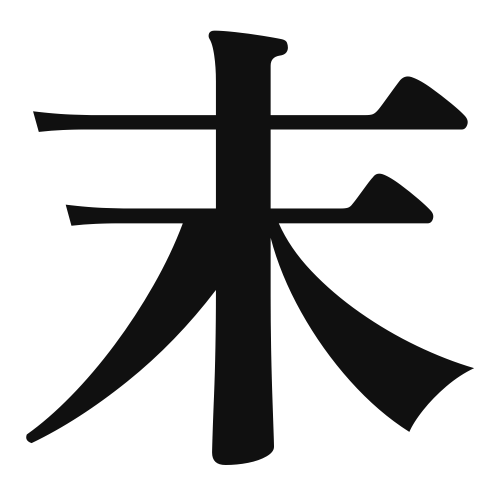1. Overview of Meaning
The kanji “末” (matsu) generally means “end” or “tip.” It is often used to refer to the final part of something or the conclusion of a process.
2. Formation and Radical
Formation of the Kanji: The kanji “末” is a phonetic-ideographic character (形声文字). It combines the meaning of “tree” (木) at the bottom, representing growth or life, with a phonetic component that suggests its pronunciation.
Radical: The radical of “末” is “木” (tree), which is commonly associated with nature and growth.
3. Examples of Usage
Common Words and Phrases:
- 末尾 (matsubi) – end, tail
- 末っ子 (matsukko) – youngest child
- 年末 (nenmatsu) – end of the year
Example Sentences in Daily Conversation:
- この本の末尾には参考文献が載っています。 (Kono hon no matsubi ni wa sankō bunken ga noっています。) – This book has references at the end.
- 彼は末っ子なので、いつも甘やかされています。 (Kare wa matsukko na node, itsumo amayakasa reteimasu.) – He is the youngest child, so he is always spoiled.
4. Synonyms and Antonyms
Similar Kanji:
- 終 (shū) – end, finish (more definitive than 末)
- 終わり (owari) – end, conclusion (used in a more general context)
Antonyms:
- 始 (shi) – beginning, start
- 初 (hatsu) – first, initial
5. Cultural and Historical Background
Relation to Japanese Culture: The concept of “end” is significant in Japanese culture, often associated with the changing of seasons and the cyclical nature of life. The end of the year, for example, is a time for reflection and preparation for new beginnings.
Proverbs and Idioms:
- 「終わり良ければ全て良し」 (Owari yokereba subete yoshi) – All’s well that ends well.
- 「末はどうなるか分からない」 (Matsu wa dō naru ka wakaranai) – You never know how things will turn out in the end.
